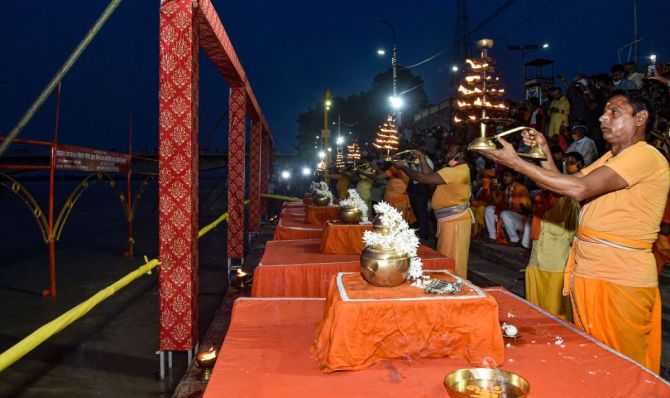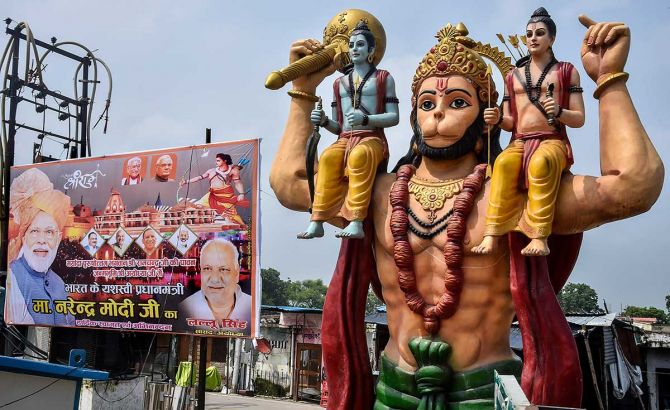 | « Back to article | Print this article |
The choice of August 5 as the day of the bhoomi puja coincides with the abolition of Kashmir's special status on the same day a year ago.
Perhaps the RSS-BJP wants August 5 to be remembered as the date on which the foundation stone of their cherished Hindu rashtra was laid, notes Amulya Ganguli.

What began 35 years ago with a reference by the Vishwa Hindu Parishad to Lord Ram's putative birthplace in Ayodhya is now nearing a climax with a 'bhoomi puja' or the auspicious ground-breaking ceremony by Narendra Damodardas Modi to inaugurate the construction of a temple on a site deemed holy by a section of Hindus.
Although the Hindutva brotherhood emphasises a prolonged 'struggle' to reclaim the Hindu god's birthplace from the iconoclastic attempt by the Mughal emperor Babur in 1528 to build a mosque on the site, it wasn't until the VHP unexpectedly raised the issue in 1985 that the matter came to the forefront of public life to the surprise of not a few people.
Neither the Jan Sangh nor its mentor, the Rashtriya Swayamsevak Sangh, had paid much attention to the issue till the early 1990s.
It took the Bharatiya Janata Party four years to refer to the VHP's 1985 call for 'recovering' the birthplace from the Muslims.
The VHP's choice of the year was also significant since it came just as year after the BJP's crushing defeat in the 1984 parliamentary polls when the party could win only two Lok Sabha seats.
It is noteworthy that the BJP's president at the time, Atal Bihari Vajpayee, said soon afterwards that it was perhaps the time for the party to consider whether its then professed ideology of Gandhian socialism was leading it in the right direction or whether there was a need for it to change course.
The introspection was not unlike what happened to the Muslim League in 1937 when it realised after its comprehensive electoral defeat by the Congress that it needed a new political approach to recover lost ground.
The line which the League chose was an extremist one to rally its supporters: 'Islam khatre mein hai (Islam is in danger)', which turned out to be the basis of its two-nation theory leading to the subcontinent's Partition a decade later.
Similarly, the BJP fell back on its Hindu vote bank to claw its way into political reckoning.
Like the League's half a century ago, the BJP's slogan, too, was religion-based with the party underlining not only the need to 'liberate' Lord Ram's birthplace from the grasp of the Muslims by 'removing' the mosque 'brick by brick', as the saffronites said, but also highlighting how thousands of other temples had been destroyed by Muslim invaders.

It was not long after the RSS-BJP began their campaign to reclaim the 'disputed' site that they realised that they had hit a political lodestone, for the faith-based propaganda rapidly catapulted the BJP to centre-stage from the margins of Indian politics where it had languished ever since its predecessor, the Jan Sangh, was constituted in the 1950s.
The bhoomi puja is the culmination of that momentous transformation from a party of lower middle class, orthodox, Hindu traders of north India which despaired of ever reaching the corridors of power to one with not only a wider social and professional base, but also capable of being ensconced at the Centre and in several states, appearing to its supporters as the natural party of governance as the Congress once was.
The BJP's phenomenal journey has also convinced the party of its ability to mould the country into its own ideological shape with the implementation of a Hindutva agenda.
The temple is the cornerstone of this religious-cultural programme which highlights the primacy of the Hindus in Indian society and politics.
It also aims at telling all other religious communities -- Muslims, Christians, Sikhs, Jains, Buddhists, Jews, Zoroastrians, animists, atheists and others -- that for all practical purposes, they are living in a Hindu rashtra (nation) in all but name.
However, the sporadic attempts even to tamper with this nomenclature by filing legal petitions seeking to change the name of 'India' to 'Bharat' or dropping the Constitutional provisions in favour of secularism and socialism are also a part of an overall endeavour to make the country as different as possible from what it was when the supposedly anglicized and deracinated liberals subscribing to Jawaharlal Nehru's multicultural "idea" of India were in power.
It was a disinclination to dispense with this pluralist vision which made the BJP's first prime minster, Atal Bihari Vajpayee, decide to put on hold the construction of the temple, the abrogation of Kashmir's special status under Article 370 of the Constitution and introducing a uniform civil code which had long been the key items on the RSS-Jan Sangh-BJP's Hindutva project.
Vajpayee announced his decision in 1996.
It has taken his party a quarter of a century to do the opposite of what he wanted.
Interestingly, the choice of August 5 as the day of the bhoomi puja coincides with the abolition of Kashmir's special status on the same day a year ago.
Perhaps the RSS-BJP wants August 5 to be remembered as the date on which the foundation stone of their cherished Hindu rashtra was laid.
But history pursues its own meandering course and few outside the saffron camp will be able to predict with certainty that the Hindutva lobby will succeed in achieving its objective.
As voting percentages reveal, those who do not subscribe to the BJP's worldview comprise 63 per cent of the population.
How relevant to them is the defining symbolism of the temple as India's sole identity?
Amulya Ganguli is a writer on current affairs.
Feature Presentation: Aslam Hunani/Rediff.com